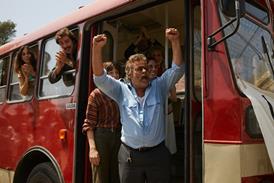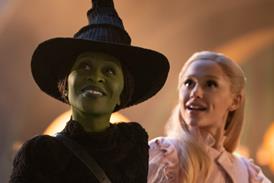Dir: Christophe Barratier. France. 2003. 95 mins.
The hottest ticket at the European Film Market in Berlin this year, Les Choristes is the kind of heart-warming, sentimental yarn that some critics might look down on but which crowds are bound to queue around the block for. Fictionally covering the same territory as the tremendously successful documentary Etre Et Avoir, this tale of an unemployed music teacher, hired as the supervisor of a correctional school where he uses music to both tame his unruly students and defeat the brutal methods of its head master, unashamedly piles all the cliches of the genre one on top of the other. However, it does so with such good spirits and with so much relish that few will be able to resist its charm.
With comic Gerard Jugnot offering an affectionate performance in the lead and with a bunch of kids who obviously had the time of their life breaking all the rules and abusing the adults in charge, Christophe Barratier's picture is the kind of family entertainment that will go far - and not only with French audiences. At time of writing, several US bidders were in negotiations for North American rights, with Pathe believed to have received a firm offer from Miramax. Pathe executives were confident of a second studio-level bid, having left Berlin early to screen the film again for an unnamed company in Paris. The film is released by Pathe in France on March 17.
The year is 1948. Clement Mathieu (Jugnot) is a chubby, middle-aged, good-natured and rather frumpy music teacher, dreaming, like most music teachers, of becoming a great composer. Instead he finds himself in charge of a whole bunch of misfit children, some of them orphans whose parents lost their lives in the war, others kids from destitute families or unruly brats whose parents have given up on them.
He has no previous experience to guide him nor any particular charms, except his natural common sense and a lot of sympathy for this brood that everybody seems very happy to be rid of. From the very first he is determined to side with his pupils and take their side every time authority, represented by headmaster Rachin (Francois Berleaud) threatens to raise its cane and strike.
Naturally, time is needed to overcome the natural suspicion of these children for whom adults in general and teachers in particular are the natural enemy. Yet undaunted by their pranks he persists until he finds a way to their hearts, first by displaying a level of understanding they have been denied before, then by unveiling for them a gift they possessed but no one had ever thought of exploring with them: that of making music together.
Director Barratier rarely misses any of the formulas ever utilised for this popular genre, airing most of them at some time during the proceedings. They include the compassionate teacher facing the narrow-minded authoritarian who slaps the children around; the handsome, rebellious kid who has the voice of an angel and the temper of a fiend; the cute little tyke who refuses to believe his parents have been killed in the war and goes down to the gate to wait for them every single weekend; and the bully who terrorises kids and teachers alike.
Music here supplements the purpose usually accorded to sport in a film like this, namely of providing a goal that everyone can identify with. Predictably enough, no one believes at first it is possible to convince the recalcitrant pupils to sing together, or for that matter, to do anything else together in an orderly manner. Again, quite predictably, Mathieu not only turns the trick but also gains their affections in the process. Even the inevitable touch of romance is in place, as Mathieu nurses secret affection for the mother of one of his students.
If it all works so well, despite all the well-trodden paths this sort of picture has been down before, then it is first due to Barratier's simple, unassuming approach, ever taking himself or his tale too seriously yet at the same time, never missing a chance to tug at the strings of the heart just at the right moment.
There are no unnecessary flourishes, and, probably most important, the story never lingers too long on any of the numerous incidents stringed together for the occasion. There is no time to wonder how come this rowdy, hoarse brood reaches so quickly the crystal-clear resonance of the Vienna Children's Choir, for there is always something else to draw the attention, be it a bottle of ink landing on the head of the supervisor, cash disappearing from the desk of the head master or the mathematics teacher unveiling a musical soul behind his dour countenance.
Jugnot accounts himself admirably as Mathieu, deftly manoeuvring between his character's determination and shyness, while Berleand provides an adequately amusing villain who is always happy to take credit for other people's feats. Incidentally, producer Jacques Perrin throws in a guest performance at the two ends of the picture, just like he did a few years back in Cinema Paradiso. No film could ask for a better omen.
Prod co: Galatee Films, France 2 Cinema, Renn Productions
Int'l sales: Pathe Int'l (Fr)
Fr dist: Pathe Dist
Prod: Jacques Perrin
Scr: Christophe Barratier, Philippe Lopes-Curval
Cinematography: Dominique Gentil
Ed: Yves Deschamps
Prod. des: Francois Chavaud
Music: Bruno Coulais
Sound: Daniel Sobrino
Main cast: Gerard Jugnot, Francois Berleand, Jacques Perrin, Kad Merad, Marie Bunel, Philippe de Janerand, Jean-Paul Bonnaire, Didier Flamand, Carole Weiss


















No comments yet